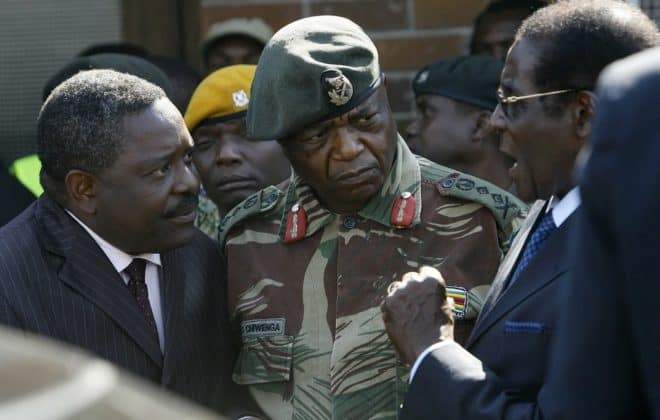From P.O.S.A to Cyber Crime Bill, How Mugabe is Rigging 2018 Elections
Charles Mabhena
Zimbabwean President Robert Mugabe is leaving no stone unturned in his quest to clinch to power, he is making sure that all the parts of his vote rigging machine are oiled and functional as the clock is slowly ticking towards the much anticipated 2018.
First it was violence and intimidation, then came the distribution of food along partisan lines, as if tying all the loose ends and tightening of all the screws on the machine, it is now cyber crime bill and media reforms, which is now making headlines.
The bill which is still at drafting stage and meant to tighten the loose ends has come under attack from the civic society, who viewed it as a way to shut them up, following the successful use of social media to organise protests. Analysts are of the view that the government reacted swiftly to invoke the bill after the realisation that the Public Order and Security Act (POSA) that restrict the coming together or forming groups was circumvented by the use of social media to organise civil action.
A lawyer and legal officer at VERITAS Zimbabwe, Kuda Hove says it is not entirely correct to say the government is rushing the bill, which has no legal effect at the moment, as it has been in the pipeline since 2012.
Asked if the bill is not a ploy by the ZANU PF government to address the shortcomings of POSA, which was recently sidestepped by the citizens, who organised themselves to stage protests through social media, Hove said; “The government might have tried that, but, the Courts have defended the right to use social media to organise protests.”
Mugabe has a track record of understanding the power of information and knowledge in vote rigging, he knew that people are shaped and are what they are because of the type of information they are exposed to. One philosopher once said; “We are what we are because of what we read and write.”
What pushes people to search for information is the need to solve problems at hand, and Mugabe knows that. It is now clear that Mugabe is using the power of information to rig the 2018 elections.
Having had recently noticed that his tactics were being threatened by social media he rushed in to promulgate a bill that would criminalise the dissemination of information that is against his government.
Journalists are not spared as many will be charged under what ZANU PF calls ‘production of malicious information bent on inciting violence and public despondency.’
One could be forgiven in thinking that the regime’s sixth sense in the value of knowledge or information, in shaping people’s minds and decisions is the major reason why there is no peace between journalists and Mugabe’s Central Intelligence Organisation (CIO).
Zim News happened to attend a press conference held by the Norton independent candidate Temba Mliswa, at the media centre in Harare on 14 September.
The meeting was also attended by suspected members of the CIO. The situation was tense in the room, and to cement the people’s suspicions was the element that any journalist who asked a question, had his or her photograph taken, for reasons better known to them.
There are suspicions that the photos were to be used for the CIO database, when they need to trail the journalist later.
Some scribes who spoke to Zim News after the meeting expressed worry over the move, saying to them, Mugabe was now spying on them. One journalist had this to say; “I remember during the burial of top CIO boss Menard Livingstone Muzariri in 2011, President Mugabe told mourners at the National Heroes Acre that his CIOs are everywhere and are watching on the people.”
The days when Mugabe’s spin doctor, Professor Jonathan Moyo, was in charge of the ministry that dealt with the media, comes to mind, he introduced radio jingles that were played frequently on national radio stations. Little did people knew that by doing so he was putting a doctrine into the electorate’s minds, most people ended up falling in love with the jingles, such as ‘rambai makashinga, mombe mbiri nemadhongi mashanu.’ Such jingles were meant to sell ZANU PF’s badly implemented Fast Track Land Reform Programme (FTLRP) that has since contributed to the current economic downturn and eroded investors’ confidence.
While it is not rigging to sell one’s party on national radio, but the rigging part comes when you monopolise that stage. If all opposition parties were given equal space, then, it couldn’t have made headlines.
According to Jestina Mukoko media reforms are important for the democratic conducting of elections as had been identified emphasised by all political parties. Mukoko says a nonpartisan public media that ensures different political parties have equal access to public media is important for the holding of free and fair elections.
During a workshop hosted recently in the country by the Zimbabwe Information and Communication Technologies, it came out that the bill, which has great chances of sailing through once tabled owing to the movers (ZANU PF) who makes up the majority in parliament, had a lot of irregularities, which the ruling part is not interested to correct, as doing so might level the playing field a bit.
Most recently, Jonathan Moyo shocked the world when he confessed that his party is not interested in making electoral reforms (including media reforms) when he said no government may introduce reforms that would push it out of power.













